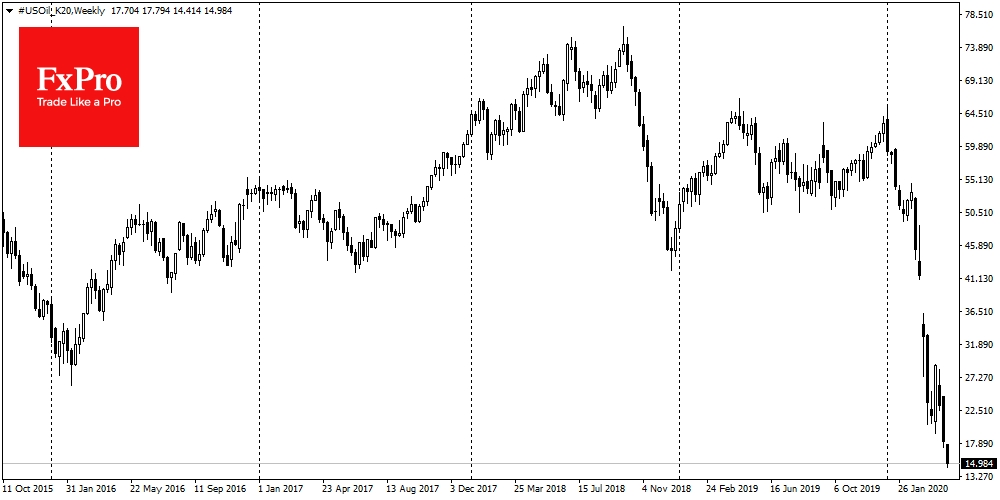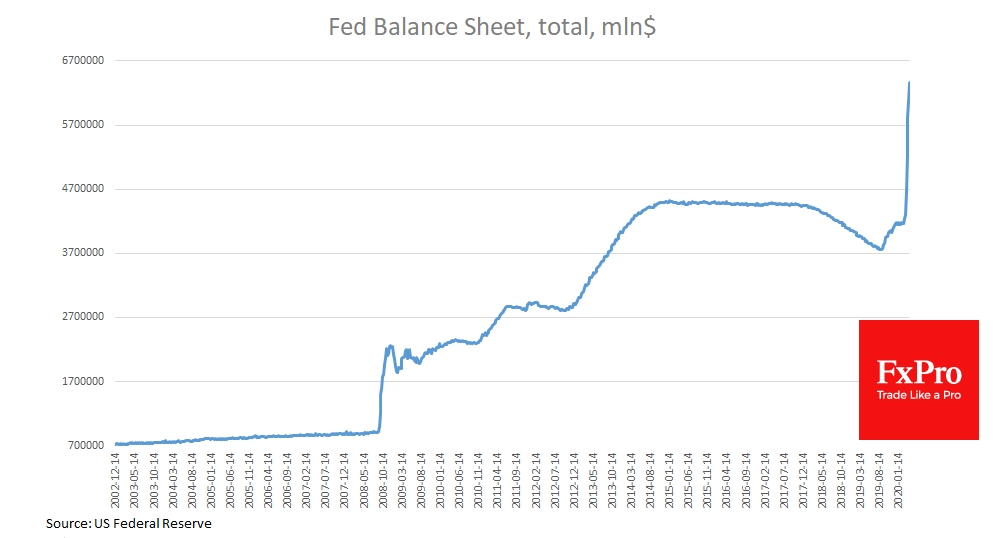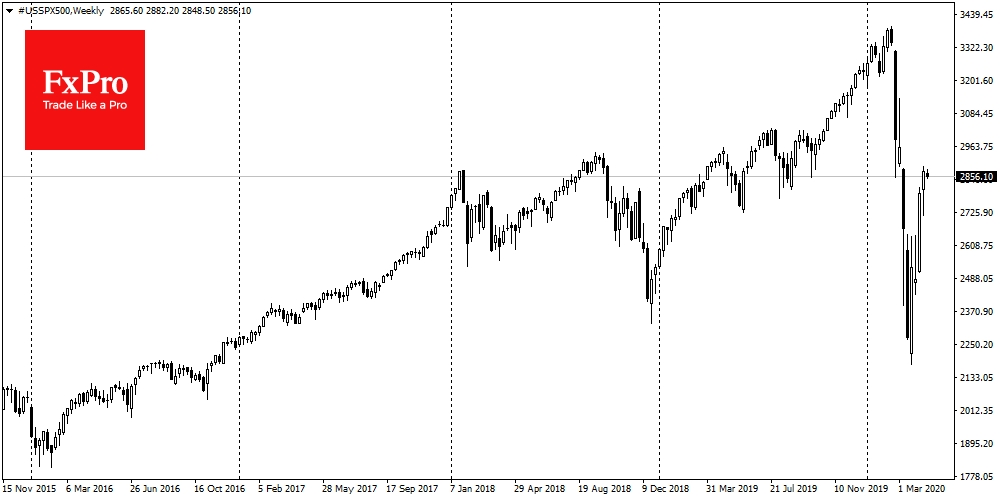As the number of new infections in the world stabilises and restrictions ease in the U.S. and Europe, investors are increasingly turning their attention to economic losses.
Futures on American oil are in free fall, and this is a clear manifestation of economic damage. The price of the May contract for WTI has collapsed 17% in the morning to the lowest level since 1999. The cost of some grades of oil in the U.S. has fallen to $2, as the oil storage facilities are almost full, despite the decline in production.
In recent years, the U.S. oil industry has been increasing its influence on the economy, along with production volumes. The oil shale revolution, with its sharp decline in oil production costs, is only part of history. The era of near-zero interest rates fed this revolution. Small American companies borrowed massively from banks and debt markets.
Now they are on the verge of collapse, desperate to find money to survive. However, bankruptcies have already begun, and further price cuts will inevitably lead to new victims. What’s happening in the oil market is increasing the anxiety of financial markets. Banks are forced to build up reserves in preparation for rising bad loans.
Unprecedented asset purchases on the Fed’s balance sheet help to keep debt markets from collapsing now, but banks are absorbing part of the liquidity. As a result, not everything reaches the markets. This was the case in 2008 when the liquidity crisis was gaining momentum despite the Fed’s credit lines and rate cuts. That was when banks became a bottleneck and a centre of problems in the financial system.
Right now, we are somewhere at the beginning of this process, and we have yet to see how well the government and regulators have done their work on mistakes. Direct distribution of money to citizens and active participation in lending to small and medium-sized businesses in many countries can be considered a financial innovation.
Together with the catastrophic drop in government revenues, this is putting public finances at risk in many countries. It is not an exaggeration to say that the problem of the budget deficit will affect all countries to some extent.
Governments become debtors of last resort, although even without the epidemic, many have served record debts and chronic deficits. The IMF reported that about 100 countries approached it for debt deferral or restructuring (write-offs). Most of them were emerging economies. Indulgences for one of them increase the perseverance among the others, forcing investors to seek shelter.
But where can we find it if the debt markets of Europe, Japan and the U.S. (traditional safe-havens) are vulnerable to the same problem? The U.S. budget is predicted to face a $4 trillion “hole” this year – many times higher than in previous years. How can we expect Trump to turn a blind eye to an avalanche of defaults (reduced liabilities) for other countries and not push the same thing for the U.S.?
The FxPro Analyst Team
- English (UK)
- English (India)
- English (Canada)
- English (Australia)
- English (South Africa)
- English (Philippines)
- English (Nigeria)
- Deutsch
- Español (España)
- Español (México)
- Français
- Italiano
- Nederlands
- Português (Portugal)
- Polski
- Português (Brasil)
- Русский
- Türkçe
- العربية
- Ελληνικά
- Svenska
- Suomi
- עברית
- 日本語
- 한국어
- 简体中文
- 繁體中文
- Bahasa Indonesia
- Bahasa Melayu
- ไทย
- Tiếng Việt
- हिंदी
The Snowball Of World Defaults Starts With Oil
Published 04/20/2020, 06:19 AM
Updated 03/21/2024, 07:45 AM
The Snowball Of World Defaults Starts With Oil
3rd party Ad. Not an offer or recommendation by Investing.com. See disclosure here or
remove ads
.
Latest comments
Install Our App
Risk Disclosure: Trading in financial instruments and/or cryptocurrencies involves high risks including the risk of losing some, or all, of your investment amount, and may not be suitable for all investors. Prices of cryptocurrencies are extremely volatile and may be affected by external factors such as financial, regulatory or political events. Trading on margin increases the financial risks.
Before deciding to trade in financial instrument or cryptocurrencies you should be fully informed of the risks and costs associated with trading the financial markets, carefully consider your investment objectives, level of experience, and risk appetite, and seek professional advice where needed.
Fusion Media would like to remind you that the data contained in this website is not necessarily real-time nor accurate. The data and prices on the website are not necessarily provided by any market or exchange, but may be provided by market makers, and so prices may not be accurate and may differ from the actual price at any given market, meaning prices are indicative and not appropriate for trading purposes. Fusion Media and any provider of the data contained in this website will not accept liability for any loss or damage as a result of your trading, or your reliance on the information contained within this website.
It is prohibited to use, store, reproduce, display, modify, transmit or distribute the data contained in this website without the explicit prior written permission of Fusion Media and/or the data provider. All intellectual property rights are reserved by the providers and/or the exchange providing the data contained in this website.
Fusion Media may be compensated by the advertisers that appear on the website, based on your interaction with the advertisements or advertisers.
Before deciding to trade in financial instrument or cryptocurrencies you should be fully informed of the risks and costs associated with trading the financial markets, carefully consider your investment objectives, level of experience, and risk appetite, and seek professional advice where needed.
Fusion Media would like to remind you that the data contained in this website is not necessarily real-time nor accurate. The data and prices on the website are not necessarily provided by any market or exchange, but may be provided by market makers, and so prices may not be accurate and may differ from the actual price at any given market, meaning prices are indicative and not appropriate for trading purposes. Fusion Media and any provider of the data contained in this website will not accept liability for any loss or damage as a result of your trading, or your reliance on the information contained within this website.
It is prohibited to use, store, reproduce, display, modify, transmit or distribute the data contained in this website without the explicit prior written permission of Fusion Media and/or the data provider. All intellectual property rights are reserved by the providers and/or the exchange providing the data contained in this website.
Fusion Media may be compensated by the advertisers that appear on the website, based on your interaction with the advertisements or advertisers.
© 2007-2024 - Fusion Media Limited. All Rights Reserved.
